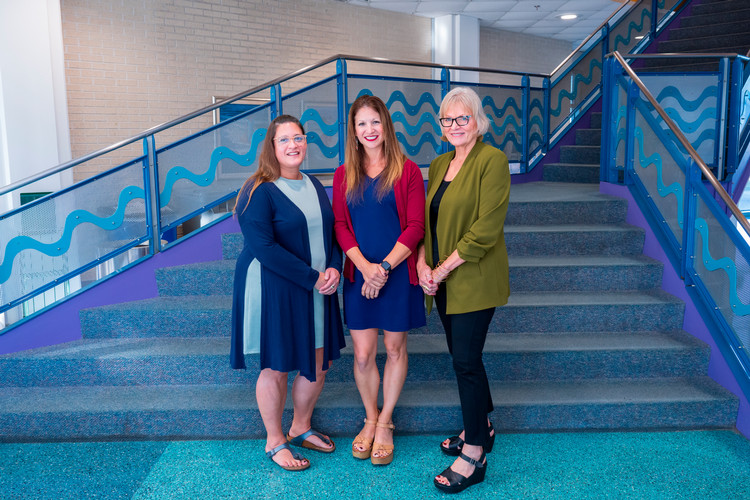Islanders Compete to Make World a Better Place During Invent for the Planet
CORPUS CHRISTI, Texas – Energy demands. Homelessness. Ocean trash heaps. The Australian bush fires. More than 600 minds gathered to collectively tackle world-wide issues during Invent for the Planet 2020. Over a 48-hour period, teams from 38 universities around the world worked together to create effective, sustainable solutions to one of 11 different problems.
The Division of Research and Innovation partnered with the College of Science and Engineering, the Mary and Jeff Bell Library, and Information Technology to host two teams of Texas A&M University-Corpus Christi students in the Invent for the Planet (IFTP20) design competition from Feb. 14-16. The interdisciplinary teams, named Pangea and the Trash Busters, identified one problem from a list of 11 to collaboratively solve. The winners receive cash prizes and move on to international-level competitions.
Team Pangea focused on the issue of homelessness census tracking. Often local governments and nonprofit organizations struggle to gather accurate numbers of the homeless in their area, making it difficult to determine if services are effectively helping this population. To combat this issue, Pangea created a fingerprint scanning app that would gather real-time data on homeless individuals, allowing for more seamless tracking of this group. The app would come with an attachment that allows for fingerprint scanning.
“The reason we chose this issue was because we see a real problem with homelessness in Corpus Christi,” said Subin Subedi, senior computer science major and Pangea member. “We think the official count of the homeless in our city is low and doesn’t reflect the actual total of individuals. An accurate count is essential to ensuring the homeless receive funding for the services that they deserve.”
Peyton Garland, Master of Business Administration student and Pangea member, agreed.
“Accurate numbers will help the city know exactly how many people there are, and they’ll be able to accommodate them and increase funding toward homeless programs as needed,” he said.
Meanwhile, the Trash Busters decided to take on the challenge of the trash heaps floating in the Northern Pacific Ocean. Not only are there large quantities of floating plastics causing massive damage to marine life, but small, micro-plastics within the water are becoming increasingly more toxic.
The Trash Busters chose to approach this problem using unmanned technology, creating the design for a large mothership with smaller pod ships that rove the ocean for pollutants. These ships would identify garbage in the ocean using a specific wavelength of infrared light that is reflected by plastic, thus telling the unmanned ships its location for collection.
“In several of my classes, I’ve heard people talking about different stories and possible solutions to the trash in the ocean,” said Reuben Brantley, senior mechanical engineering student and Trash Busters member. “Now we’re the ones trying to fix it ourselves.”
Sharmeen Ahmed, Research and Commercialization Analyst at Texas A&M-Corpus Christi and international judge of the global IFTP20 competition, facilitated the event and is so proud of the two teams that competed.
“Invent for the planet provides an opportunity for students to showcase the innovation and creative skills gained in their education and to engage global problems while competing for recognition, The students work in interdisciplinary teams to solve real life problems, preparing for the workplace. ” Ahmed said. “I’m proud of these students who are demonstrating excellence and Islander Impact on our communities.”
The Division of R&I thanks the mentors who supported the students, Dr. David Bridges, Associate Professor & Chair of the Department of Engineering, Dr. Scott King, Associate Professor & Chair of the Department of Computing Sciences and Dr. Jose Baca, Assistant Professor, Department of Engineering and judges Dr. Ahmed Mahdy, VP of Research & Innovation, Dr. David Gurney, Associate Professor & Chair of the Department of Communication and Media and Mr. Michael Logan, head of the NASA Langley Small Unmanned Aerial Vehicle Laboratory.
In March, a panel of international judges will select the top five teams from around the world, and those teams will travel to Texas A&M- College Station for a final pitch competition to be held March 31- April 2. The winner will be named the champion of Invent for the Planet 2020.Pangea ultimately came out the victors, winning $1,000 and the right to be considered alongside 38 other winners across the world to compete at the International level. The Trash Busters took second place, winning $750 and will move on to the state level where they have the opportunity to win the popular vote.
“Winning our University’s Invent for the Planet competition is so amazing,” said Nicole Rothenay, Master of Science in Computer Science student. “Being able to use our skills to try to help better the world has been so rewarding.”
The students competing in this year’s Invent for the Planet competition were:
Pangea:
- Mejmoud Badawi, sophomore mechanical engineering student
- Peyton Gerland, Master of Business Administration student
- Nick Mason, senior computer science student with a concentration in cyber security
- Subin Subedi, senior computer science student
- Nicole Rothenay, Master of Science in Computer Science student
The Trash Busters:
- Reuben Brantley, senior mechanical engineering student
- Patrick Huddleson, senior mechanical engineering student
- Sandeep Jille, Master of Science in Computer Science student
- Shawn Ybarra, sophomore environmental science student




























































